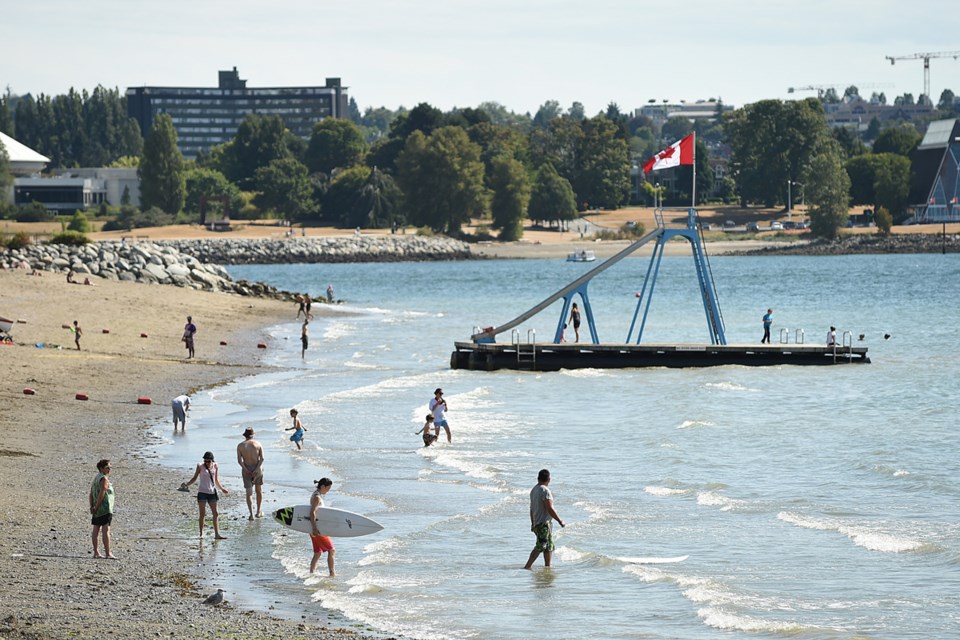With temperatures expected to hit record highs this week, Vancouver Coastal Health is reminding residents of the risks of heat-related illness.
Environment Canada has issued a special weather statement for hot weather for the South Coast, including Metro Vancouver, the Fraser Valley, Howe Sound, Whistler and the Sunshine Coast. The hot weather is expected to continue through to Thursday, with temperatures expected to hit the mid to upper 30s.
“Those most vulnerable to high temperature include young children, the elderly who are housebound in un-air-conditioned homes, those working or exercising in the heat, persons with chronic heart and lung conditions, persons with mental illness, people living alone in un-air-conditioned homes and the homeless,” the health authority said in a press release.
Young children (under the age of 5) are especially vulnerable to the heat because their smaller size makes it more difficult for the body to effectively cool itself, said Michael Brauer, professor at UBC’s school of population and public health.
“It’s really mostly a size issue.”
For the elderly, or people with a pre-existing medical condition, the heat is just another stress on the body. When the body becomes overheated, blood vessels dilate, which makes the heart work harder, in an effort to maintain a constant temperature.
The heat can also make people disoriented, which is a particular concern for people with mental illness and dementia.
When temperatures rise, it’s important to keep a close eye on those who might not be able to help themselves — young children, the elderly and people who are socially isolated, the mentally ill and the homeless.
“It’s really important for them to be checked on regularly,” Brauer said.
And never leave children or pets alone in a parked car. Temperatures can rise to 52 Celsius with 20 minutes when the outside temperature is 34 Celsius.
In addition to the hot weather, Metro Vancouver has issued an air quality advisory for Aug. 1 for the Lower Mainland and Fraser Valley. Outflow winds are expected to carry smoke and fine particulate matter into the region from the wildfires that continue to burn in the interior.
People with chronic underlying medical conditions are advised to postpone strenuous exercise until the advisory is lifted. Exposure to fine particulate matter is particularly a concern for infants, the elderly and those who have diabetes, and lung or heart disease.
Tips to beat the heat
- The best way to stay cool is air conditioning. If you don’t have air conditioning at home, seek it out in other places — malls, libraries, community centres, restaurants, movie theatres.
- Use public splash pools, water parks or pools, or take a cool bath or shower.
- Fans are less effective at higher temperatures, and can actually increase dehydration, Brauer said. Applying a cool water mist or wet towels to your body prior to sitting in front of a fan is a quick way to cool off.
- Dress for the weather. Wear loose, lightweight clothing and protect yourself from the sun with a wide-brimmed hat and sunglasses.
- Avoid sunburn by staying in the shade or use sunscreen with a SPF of 30 or more.
- Keep your home cool by opening windows and keeping shades or blinds closed. Use an air conditioner, if possible, and prepare meals that do not require an oven.
- Limit outdoor activities to early morning and evening.
- Stay hydrated by drinking cool, non-alcoholic beverages throughout the day. Don’t wait until you’re thirsty.
Signs of heat-related illness:
- Extreme thirst
- Dizziness and/or fainting
- Confusion
- Weakness
- Nausea and vomiting
- Rapid breathing and heart rate
If you see someone you suspect is suffering from too much heat, call 911 and help keep them cool — move them to air conditioning, apply cool water to their face and neck — until help arrives.



